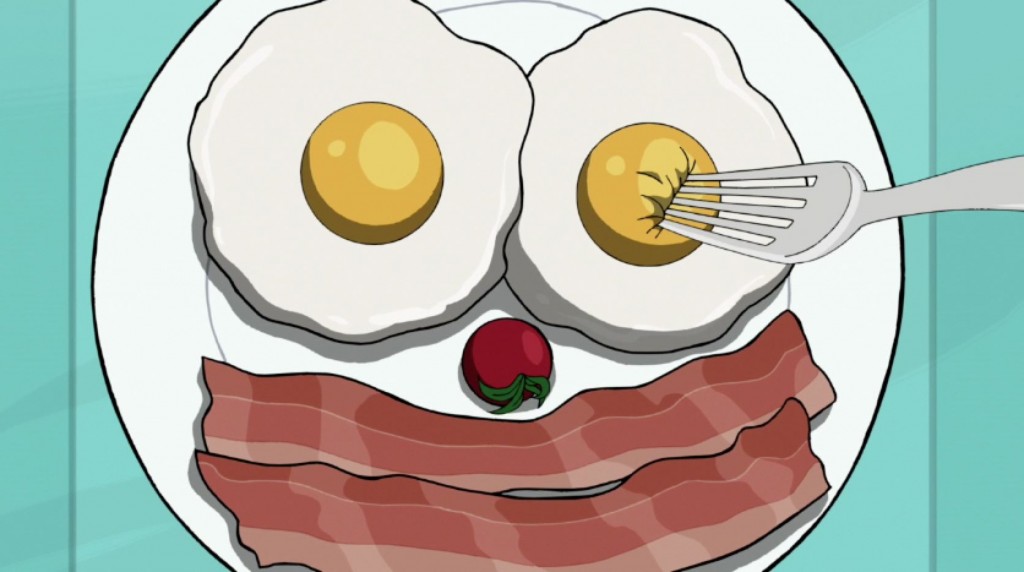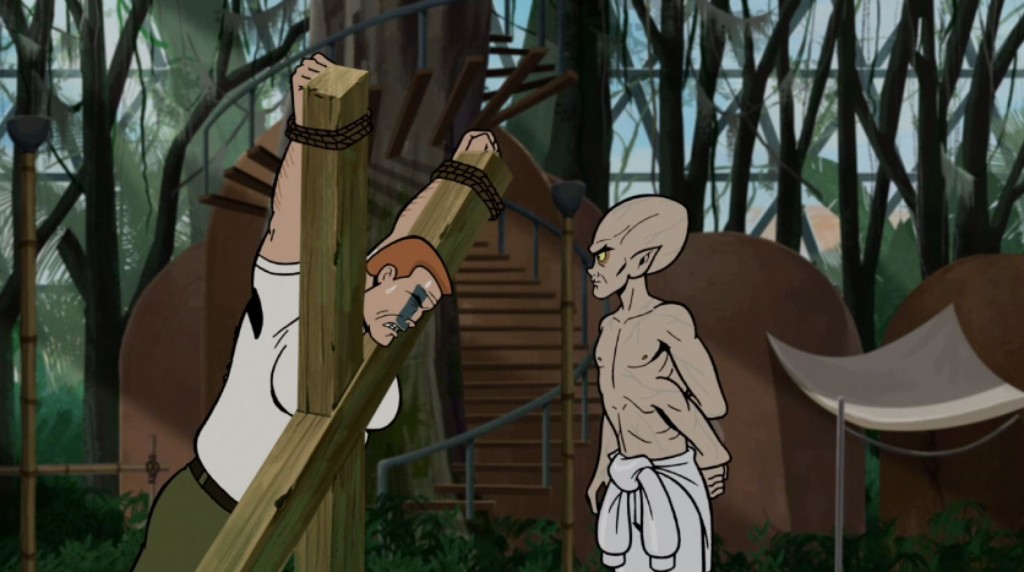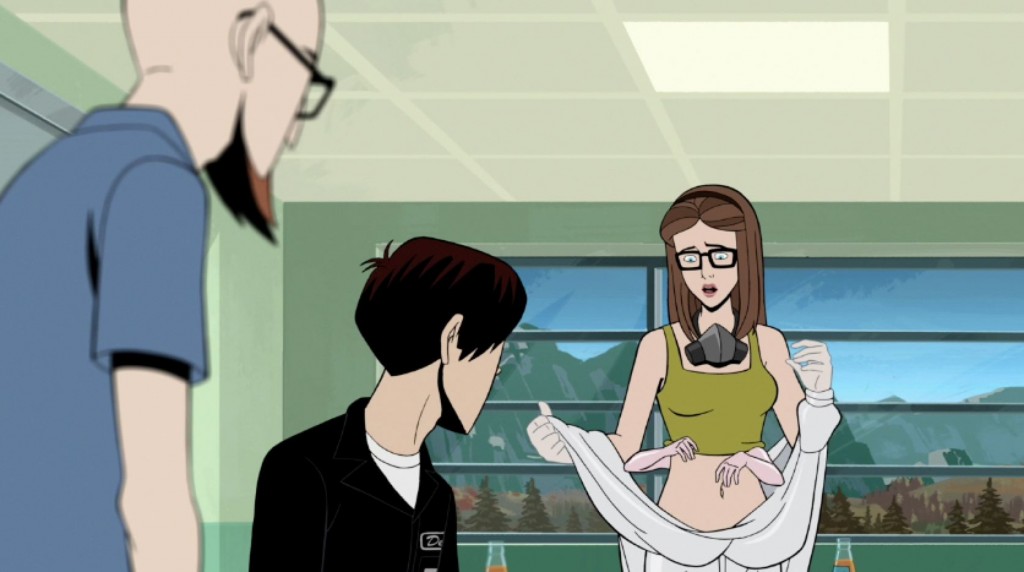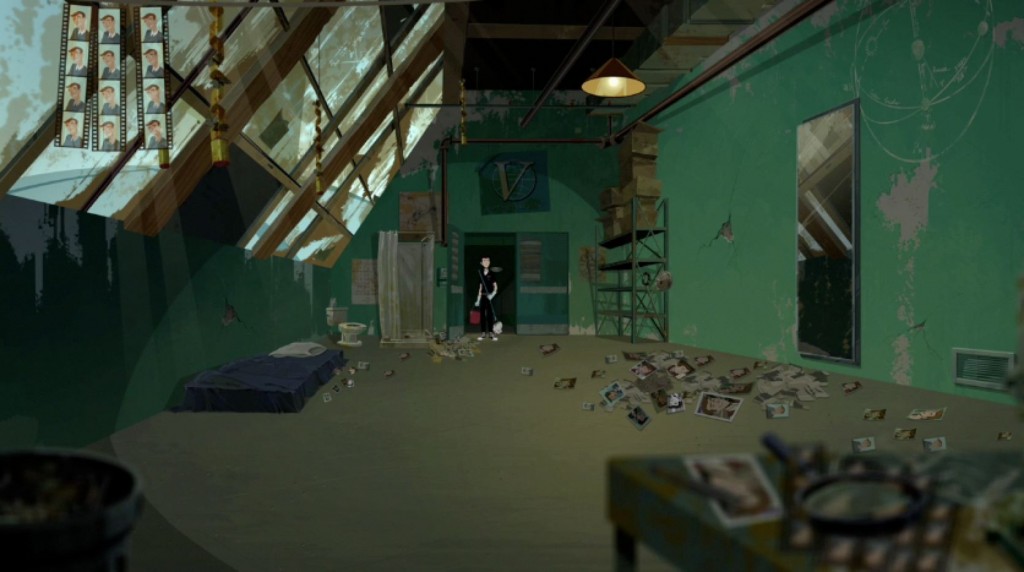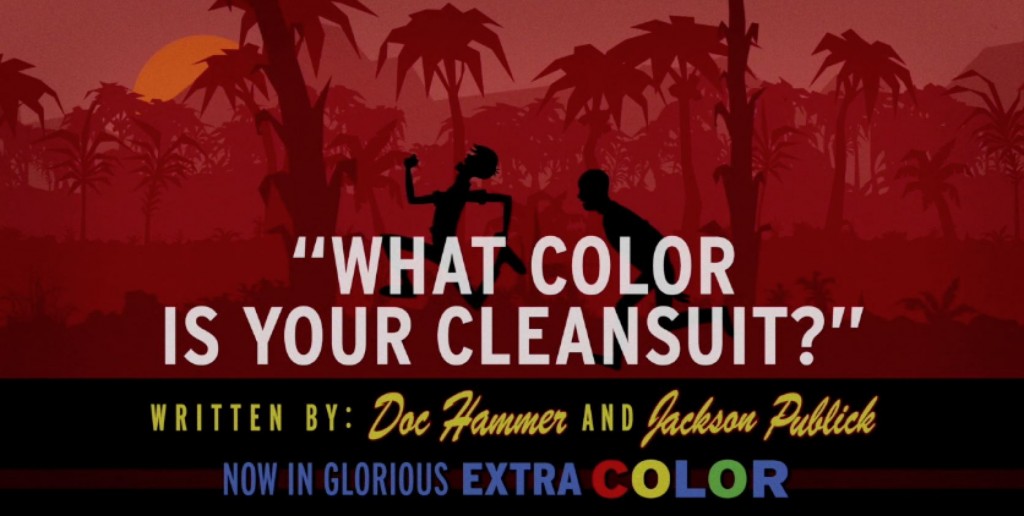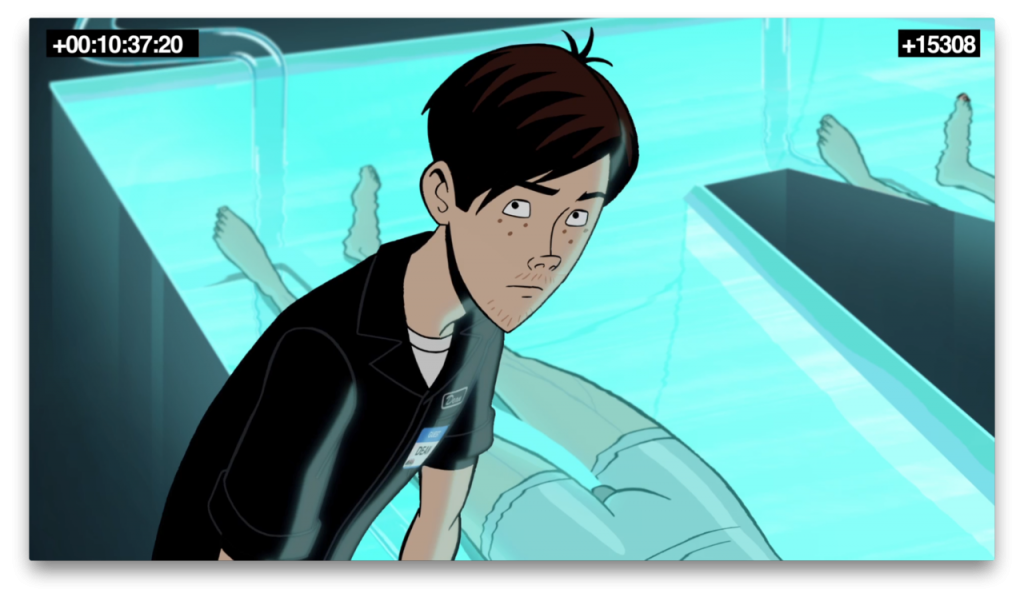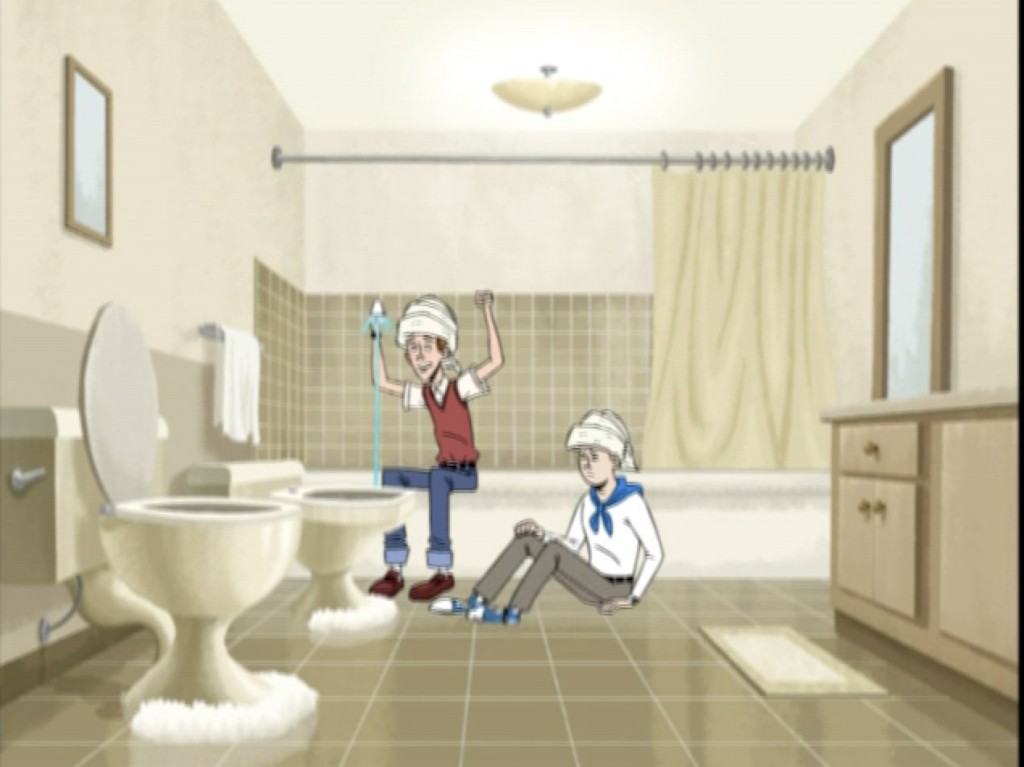The Venture Bros: “Venture Libre” part 1
A few years back, I was talking to a woman from Pixar, who explained to me the logic of Finding Nemo. Finding Nemo, she said, is about, and only about, a father’s relationship with his son. The problem presented by the narrative is that, at the end of Act I, the son is abducted. How could they make a movie about a father’s relationship with his son if the son vanishes at the end of Act I? The answer, they found, was to replace the son with another child, the forgetful fish Dory. The father then plays out the conflict with his son with this surrogate. It’s a simple yet brilliant device, and if you remove the forgetful fish and put in a reanimated corpse, it’s the same device that fuels “Venture Libre.”
The Venture Bros “What Color is Your Cleansuit?” part 4
Sgt Hatred, in his second-act low-point, finds himself bound to a St. Andrew’s Cross and whipped, something his BDSM-loving ex would have understood. Martin has now transformed into his final mutation and assumes the position of, ironically, liberator, forcing Sgt Hatred to come to terms with who he really is (in a scene, for us old people, lifted and inverted from the 1977 miniseries Roots — The Venture Bros is nothing if not free-ranging in its references). Spoiler alert, Sgt Hatred’s given name is “Courtney.” While only developing breasts now, it seems Sgt Hatred has had a feminine side all along, and now the villain-turned-good-guy must wait to be rescued like a common damsel.
The Venture Bros: “What Color is Your Cleansuit” part 3
Rusty may actually be a worse employer than he is a father, which is really saying something. After all, he may have left Hank and Dean to die countless horrible deaths over the years, but he never actually intentionally caused those deaths and he always dutifully put things back the way they were. His monomania regarding the Palaemon Project means that he overlooks interns trapped between dimensions, bizarre mutations and cannibalism. Most importantly, it interferes with Dean’s b-story, ie his romance with Thalia, a beautifully specific character, with her unflappable, widescreen collegiate manners. Dean very much wants Thalia, even after seeing her deformity (which, admittedly, is pretty tame compared to some of the things Dean’s been exposed to) but Rusty brushes that uncomfortable fact aside as well.
Venture Bros “What Color is Your Cleansuit” part 2
Dean, in his flight from his identity, moves into “the attic.” The episode breezes by it, but it’s the same room where the deformed Dean clone made his home in an earlier episode. What Dean has to “clean up” to live there, to dispose of his identity, is the remnants of a Dean who died in order to have the identity Dean wants to escape. Seeing as how Dean is already a clone several times over, the issue of identity is already a complex one. In the previous scene, he complains about having spent “years” learning useless facts in his Teaching Bed, but in fact this Dean hasn’t even been around that long. Which brings up the question explored in Moon and Oblivion: is identity genetic, or are we born as clean slates? If Hank and Dean are always Hank and Dean, no matter which Hank and Dean they are, then is the Venture family always the Venture family, or could there be variations? More important, can the family grow, and change? That is, can it break the cycle? Since “What Color is Your Cleansuit” explores the creation and evolution of another kind of family, the question is pertinent.
Read more
Venture Bros: “What Color is Your Cleansuit?” part 1
Any television show can be weird, or transgressive, or irreverent. Rules are there to be broken. The trick is to inflate the narrative with weirdness, but then nail it down something basic, something universal and irrefutable. That’s how the viewer knows the writer cares. The Venture Bros is about as weird as American television has ever been, but it ties down its weirdness with a discussion of the most basic and universal subject imaginable: family. In some ways the show is, despite its science-fiction adventure trappings, a domestic comedy, even, in its grander moments, a family saga.
Read more
nota bene
I’ll be analyzing the new season of The Venture Bros as soon as I sort out some internet issues. Thank you for your patience!
The Venture Bros: “The Terrible Secret of Turtle Bay” part 2
Act II of “The Terrible Secret of Turtle Bay” begins with a continuation of the episode’s “B” story, as Hank and Dean seek adventure while stuck in a hotel room in New York City. Their father, Dr. Venture, has forbidden them to leave. Dr. Venture was a boy adventurer when he was their age (younger even), but the grown Rusty aggressively denies the boys their own adventures. This is his trip, to exorcize his demons, the boys don’t enter into his plans. One guesses he’d rather not have the boys on the trip at all. One guesses, in fact, that he’d rather not have the boys, period.
So the boys play astronaut with a paper cup in the bidet, then, when that gets boring, they move on to playing submarine in the bathtub with the case that Rusty’s invention came in.
Read more
Venture Bros: “The Terrible Secret of Turtle Bay” part 1
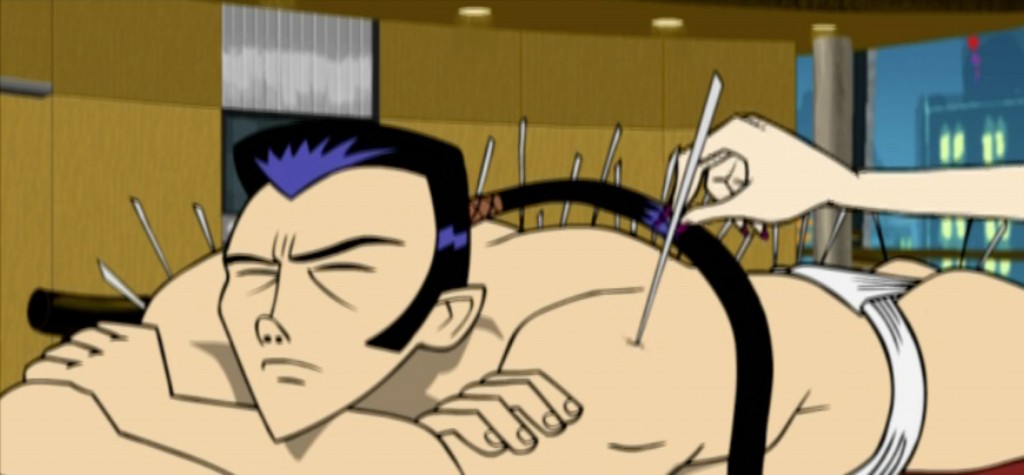
My analysis of The Venture Bros fell behind with Season 4. As Season 5 gears up, I’m going to rectify that, but I’m also going to go back and look at Season 1, starting with the pilot, “The Terrible Secret of Turtle Bay.”
A pilot episode is a tricky thing. The intent is to introduce the viewer to the world of the show, but too many pilots err too far on the side of introduction. The narrative of a pilot script often pauses too many times to introduce a character or an element, slowing things down and feeling, essentially, too much like a movie and not enough like a TV show. The desired effect of a pilot is have it feel like a mid-season episode: that’s when television works best, when the world has already been established and characters can groove on each other instead of introducing themselves.
Read more
“Vance”
A Southern Gothic Musical Hairball by Reuben Saunders. Produced and directed by Holly Golden, shot and edited by yours truly.
Venture Bros history
It’s my intention to take up analyzing the Venture Bros episodes as they are aired, so I found this especially helpful.
